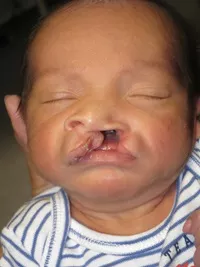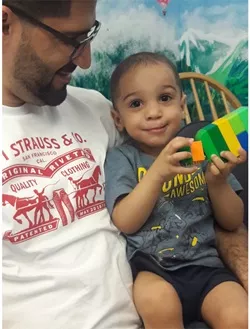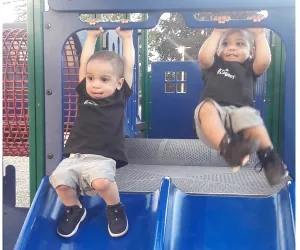
When a routine ultrasound found that one of Tricia’s twin sons had unilateral cleft lip and palate, she was immediately referred to Dr. Andrew Scott, Medical Director of the Cleft Lip and Palate Program at Tufts Medical Center.
“I was scared when I was first told Luis had a cleft lip and palate because I had never seen a child with that condition before,” Tricia said. “On top of that, reading information suggesting that he might need upwards of 10 surgeries was really overwhelming.”
Unilateral cleft lip and palate occurs when parts of the baby’s face don’t fuse together properly in the womb, resulting in a separation of the upper lip, gumline and roof of mouth, which can extend up and into the nose. Luis would need specialized care from experts in dentistry, surgery, speech, feeding and more.
The beginning of a long journey
Tricia was not a stranger to Tufts MC – she had worked here for years but was rarely a patient. She was incredibly anxious for her first visit with Dr. Scott, but that anxiety quickly faded when he assured her, “I don’t care if I’m dining with my wife or I’m sleeping – call me anytime.”
At just four weeks, Luis began the process of nasoalveolar molding (NAM), a nonsurgical method of reshaping the gums, lips and nostrils before surgery. This meant that for the next nine weeks, Tricia would bring Luis in for weekly appointments at the Tufts School of Dental Medicine and for every-other-week appointments with Dr. Scott.
Tufts pediatric dentist Dr. Robert Zee works collaboratively with orthodontists, oral surgeons and other dentists to care for our patients with craniofacial conditions. One of the things he values most about his team is their dedicated focus on both family-centered care and continuity of care.
“We see these patients frequently so it’s essential to develop trust and rapport,” he said. “Cleft lip and palate has long lasting effects, so we need to understand what the kids and their parents are going through.”
Some bumps in the road

But like many babies, Luis had a difficult time learning to eat with this appliance in his mouth and cried constantly. “Feeding is probably most worrisome aspect of it all because parents get worried if the baby isn’t gaining weight,” Dr. Nour Fathi Gowharji, a pediatric dentist on Tricia’s care team, said.
Anticipating these problems, our multidisciplinary team was ready to take on the challenge.
While Tricia was relieved at how much support she was given by Luis’ care team, she still struggled to cope during those first few weeks of treatment. She was missing a lot of work, and she was drawing unwanted attention out in public.
“People used to look at him and point, so I covered his face,” she said. “But eventually I realized it was ok and that I shouldn’t be ashamed or embarrassed of my son.”
Two surgeries before his first birthday
Luis underwent a successful lip repair at 3 months and an equally successful palate repair at 11 months. His future surgeries should be minor and related to small adjustments needed as he continues to grow. Luis has conquered the worst, but even though he is taking a break from treatment, his care team is not.
“We stay in touch with all of the babies and continue to follow them for the rest of their lives,” Dr. Gowharji said. “They’re part of our pediatric department’s family now.”
Now, Luis is a healthy 2-year-old and looks just like his twin.
“You can’t even tell he had a cleft lip and palate anymore,” Tricia said. “It took a lot of patience, but he is doing awesome.”
